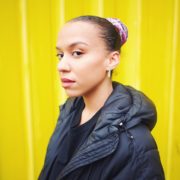Supporting women in the industry: Meet Adele, Model and body-positive activist [@Adele_Makayi ]
![Supporting women in the industry: Meet Adele, Model and body-positive activist [@Adele_Makayi ]](https://guap.co/wp-content/uploads/2020/03/Adele--180x180.jpeg)

The fashion industry has been known for damaging self-esteem and encouraging an unrealistic standard of beauty but instead of shedding light towards this we have decided to showcase women who are helping change this through their careers in fashion. We spoke to Adele Makayi, Zambian model and body-positive activist and asked her some questions on her experience as a model in both the UK and Zambia and what led her to be such a strong advocate for body positivity.

What led you to start modelling?
In all honesty, it was just for fun. However, the interest built because of the lack of representation in the industry; which is cliche I know, but the ‘not so encouraging’ comments about my weight, and the fact that such work is looked down upon. So, as I do, I convinced myself that I was going to prove two points. Firstly, anyone can model-all that matters is the amount of creativity and seriousness you commit to it. And secondly, it can be done ‘gracefully’; there are multiple stereotypes that are profiled with being a model-promiscuity being one of the main ones.
How do you think the fashion industry can change and improve?
I am already loving the direction that things are going in; there is actually representation! All skin tones, shape, heights and sizes. However, the industry is still harsh, individuals are still shamed in the process of getting a gig or a shoot. Body shaming and colourism openly takes place during auditions, not everyone has accepted that the industry has changed. For that reason, many models remain extremely self-conscious and insecure.
What’s an essential part of your self-care routine?
Quiet time-Alone time, no social media, and my journal.
As it is, my mind is already such a busy place. So there is a need for me to quieten everything around me to process my thoughts and decisions individually. This has, especially, helped me with working through my emotions in relation to my insecurities.
In what ways do you think the modelling industry can impact the world?
By the industry being as inclusive as it can, the media can relay the message that being on the front page of a magazine, or on a runway is not unattainable. We should be able to see icons that we actually look like-and relate to. ‘Airbrush and perfection’ has done nothing but damage the world’s perceived standard of beauty.

If you could work for one brand who would it be and why?
Fenty. Rihanna has pushed the boundaries with her brand concept. I would be honoured to be part of them because I know that I wouldn’t be selected on the basis that I am better or better looking than everyone else out there; but because I am representing a group of people-physically and culturally.
Is there any difference you have seen between modelling in the UK and modelling in Zambia?
Definitely. Most of the modelling in Zambia is pageantry, there is a huge gap in the editorial and commercial categories-even though there is a huge difference in the skill set of each type of modelling, bunched together and put in a box.
Also, appropriate payment and compensation is not a thing here (Zambia); and most models are taken advantage of for their time and talent. This is partly why I took a step back from it last year, the dedication you put into it rarely bears fruit. All the successful Zambian models I know are based somewhere else, where modelling is actually seen as WORK.
Lastly, and quite sadly-representation isn’t something that most people in the decision making positions have grasped, but there are upcoming platforms that are making efforts such as Zambia Fashion Week and the local Plush Angel clothing brand.
What’s one of the most valuable lessons you have learnt in your career?
Putting myself out there and opening myself up to criticism has shown me that this isn’t only about me; there are people that are impacted by the boldness with which I wear my insecurities on my sleeve. I have committed to being vulnerable and honest every step of the way, most of my journey has not been glamorous and I speak about it openly; this industry needs a bit more honesty.
What would you say to people feeling unhappy with the way they look?
There is more to you than what you look like. So I would recommend conducting a self-audit, asking yourself all the ‘why’ questions, for example, ‘Why don’t I like (particular feature)’, and take yourself through (if you can) to the root of the insecurity. Majority of the time these feelings come about because of comparison-I am constantly checking myself, we all need to.
What’s something every woman should know?
Your beauty is not external, it shines from you internally. And your beauty is not the same as anyone else’s.




![ZINO VINCI’S ‘FILTHY & DISGUSTING’EP BRINGS YOU TO THE CORE OF THE ARTIST [@ZinoVinci]](https://guap.co/wp-content/uploads/2023/10/Zino-4.jpg)



